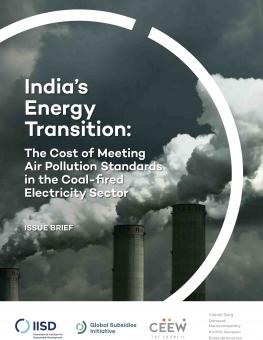
India's Energy Transition: The Cost of Meeting Air Pollution Standards in the Coal-fired Electricity Sector
It will cost up to INR 86,135 crore (USD 12 billion) to comply with India's rules for air pollution control technology in the current fleet of coal power plants, increasing the average cost of electricity by 9–21 per cent per kWh. The Ministry of Power must take a strict position to ensure compliance.
Key Messages
- The total capital expenditure required to install SOx, NOx and PM pollution-control technology is estimated to be INR 86,135 crore (USD 12 billion), or INR 73,176 crore (USD 10 billion) if plants to be retired by 2027 are excluded.
- This will add between INR 0.32 per kWh to INR 0.72 per kWh for coal power plants (or around 9–21 per cent to average tariffs) depending on the size of the unit and other factors.
- Reflecting these costs in the price of coal-based power is necessary and appropriate to ensure that the external costs of air pollution are reflected in prices and therefore used to inform investment decisions in comparison to the alternatives to coal-based generation.
- An independent assessment of retrofit costs at a plant level by empanelled agencies would expedite the ability of private sector power plants to submit tariff increase petitions to the regulators.
- Most experts are of the view that the deadline will still see many plants not complying with the new standards. To avoid this situation, the Ministry of Power must take a stricter position which precludes all non-compliant plants from generating, unless they exhibit a clear retirement or phase-out plan or have made material progress in awarding tenders and beginning the construction process.
In 2015, the Ministry of Environment, Forest and Climate Change legislated new standards to limit the concentration of sulphur oxides (SOx), nitrogen oxides (NOx), particulate matter (PM) and mercury (Hg) in stack emissions for coal-fired power plants. The Ministry amended the standards in 2018; however, there was no material change in air pollution norms. Existing thermal generators were expected to comply by December 2017. For new plants, compliance was required at the point of commissioning from January 2017. However, by December 2017, almost no coal plants had installed the equipment and the deadline was extended to 2022.
This brief extends the analysis in India’s Energy Transition, 2018 Update—a report by the International Institute for Sustainable Development (IISD) and the Council on Energy, Environment and Water (CEEW) on India's energy subsidies in financial year (FY) 2017 and FY 2018—to explore in detail the cost of compliance with regulations on air pollution and implicit subsidies associated with extensions and non-compliance.
The brief examines the following: the reasons for slow progress by coal power plants; the cost of installing pollution-control equipment for the sector and implications for the price of electricity; the cost of externalities related to human health; and a comparison of the costs of installing pollution-control equipment with phasing out non-compliant coal plants.
Participating experts
You might also be interested in
Mapping India's Energy Subsidies 2020: Fossil fuels, renewables and electric vehicles
How have India’s energy subsidy policies changed? What have been the most significant developments in India’s dynamic energy policy environment? And is public support aligned with India’s desired energy future?
India's Energy Transition: Subsidies for Fossil Fuels and Renewable Energy, 2018 Update
How have India’s energy subsidy policies changed since 2016? Have they become more or less aligned with India’s desired energy future? How have India’s energy subsidy policies changed since 2016? Have they become more or less aligned with India’s desired energy future?
Increased Support Needed to Achieve India's Clean Energy Goals
India is on track to achieve many of its 2030 clean energy goals but needs to step up government support measures to accelerate the deployment of offshore wind, electric vehicles, and green hydrogen, according to a new report.
India Faces Clean Energy Challenges as Energy Demand Soars and Global Fossil Fuel Subsidies Rise
New research finds the global energy crisis and increasing energy demand have pushed India's energy subsidies to a 9-year high.